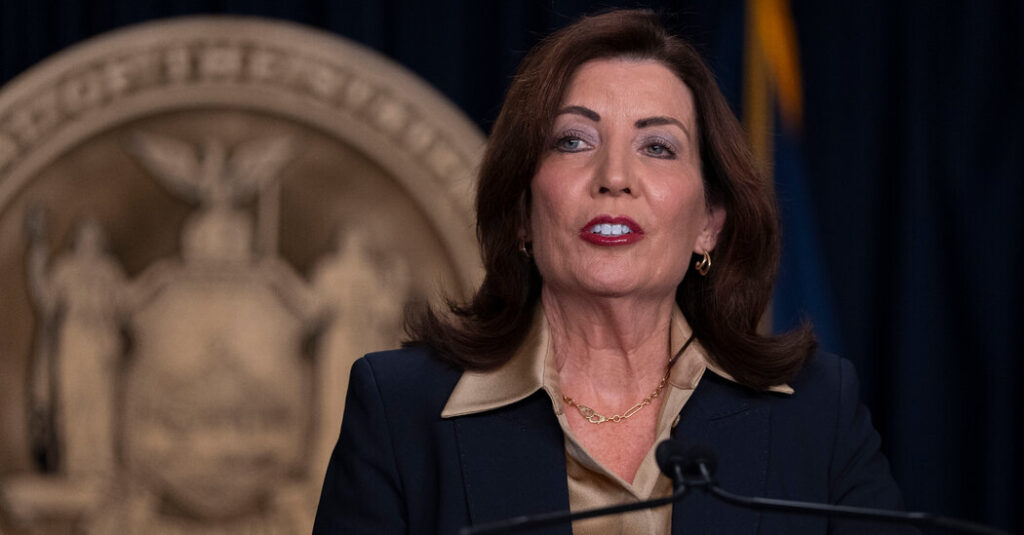
When Gov. Kathy Hochul first took office in 2021, she was a relative unknown. Few New Yorkers knew how to pronounce her name, let alone what Ms. Hochul, Andrew M. Cuomo’s seldom-seen lieutenant governor, stood for.
Since then, she has honed an executive style that is equal parts practical and protective. And while many elements inform her politics — her Buffalo roots, her Catholic faith, her business-friendly sensibility — perhaps none is more central than her role as a mother.
“Does anybody not know I’m a mom?” Ms. Hochul, a Democrat, joked at an appearance last week to celebrate her most attention-grabbing win in this year’s budget: a bell-to-bell ban on cellphones in schools. “I say it every single day: I’ve been a mom longer than I’ve been a governor.”
She built on this message in an op-ed published on Friday by Fox News, invoking her status as New York’s “first mom governor” to pledge her commitment to protecting children.
“We’re taking back our classrooms and giving kids their childhoods back,” she wrote.
The message, and her choice of a conservative news outlet to deliver it, was a striking example of how Ms. Hochul has embraced a kind of “family values” approach more in line with the Republican Party of the 1990s than with the Democratic Party of the 2020s.
Indeed, in crafting the cellphone regulations, the Hochul administration found itself looking to Republican-led states like Louisiana and Florida. Last year, when the governor embarked on a push to restrict social media companies, New York followed the lead of Utah, where the push to restrict children’s media led to the banning of books by Margaret Atwood, Rupi Kaur and Judy Blume.
Ms. Hochul is expected to face a difficult re-election challenge next year, with potential candidates from both parties considering taking her on. They include Democrats like Representative Richie Torres and Ms. Hochul’s lieutenant governor, Antonio Delgado, and Republicans like Bruce Blakeman, the Nassau County executive, and Representative Mike Lawler.
Representative Elise Stefanik, a close ally of President Trump, has also expressed interest in running, and could be a particularly formidable adversary, pitting Ms. Hochul’s Democratic conservatism against the fractious energy of Mr. Trump’s MAGA movement.
Ms. Stefanik criticized Ms. Hochul’s $254 billion budget for not doing enough to address violent crime, calling it a “desperate attempt to shore up a politically weakened and toxic governor.”
Ms. Hochul also has detractors in her own party. Her tendency to align herself with business interests and law enforcement irks some Democrats, while some state lawmakers grumble about her “because I said so” negotiating style.
Facing middling poll numbers and a persistent perception of weakness, Ms. Hochul has sometimes sought a foil in Mr. Trump, issuing stern condemnations of his policies and his attempts to eliminate congestion pricing.
Against that backdrop, it is perhaps notable that Ms. Hochul has sought to humanize her image, asking for voters to see her as a mother. Her team insists that the maternal instinct underscores her vision of what a governor should be: someone who keeps New Yorkers safe, with a roof over their head; someone who makes sure that their children eat breakfast, and who keeps those children from texting in class.
In a state where more than a quarter of voters are not registered with either major party, Ms. Hochul knows she will most likely need to win support from people who may be turned off by politics but are open to hearing from a “mom governor.”
The instinct is written across Ms. Hochul’s legislative priorities, from affordability to public safety.
This year, she pushed to make it easier for the police to remove people having mental health episodes from public spaces, built on her efforts to make New York’s bail law stricter, and gave prosecutors more leeway in turning over evidence to defense lawyers.
Her protective instincts are also visible in her cautious approach to the state’s finances and investment in reserves, which have reached their highest level in years. (This year, she will tap into those savings, to pay off businesses roughly $7 billion in Covid-era unemployment insurance debt, amid fears of a recession.)
But her maternal worldview is perhaps most evident in Ms. Hochul’s use of the state budget to pass initiatives tied to children’s well being. She expanded the child tax credit to $1,000 for children under 4, and allocated enough money to offer free breakfast and lunch for students from kindergarten through high school.
Last year, the governor regulated the use of so-called addictive algorithms that target children, and created a privacy provision that prevented social media companies from collecting children’s personal data.
Ms. Hochul has framed her actions in broad, parent-friendly terms, saying it is a moral imperative to address the increase in mental illness and the degradation of attention.
Yet in one key matter, Ms. Hochul decided against using her influence to compel private schools to provide a basic education. Instead, she included budget language to weaken state oversight over private schools.
Ms. Hochul defended the move as necessary to preserve religious freedom in New York. The change was a priority of ultra-Orthodox and Hasidic legislators representing yeshivas, which collect millions of taxpayer dollars but do not always provide a basic secular education.
The change was panned by Ms. Hochul’s own education commissioner as well as many Democratic lawmakers, who called it a politically motivated betrayal of the state’s responsibility to children.
On the Senate floor, Senator Liz Krueger, a Manhattan Democrat, called the provision “antisemitic” in that it would deprive Jewish children of a basic education, adding that the change could lead to greater erosion in education.
“With this change in law, we’re actually saying here in New York, if you define yourself as a religious school and you aren’t meeting our most basic, sub-minimal standards for actual education, come on down,” Ms. Krueger said.
But in New York’s ultra-Orthodox communities, a potentially crucial demographic for Ms. Hochul come 2026, the move was celebrated as helping to secure “freedom of education.”




